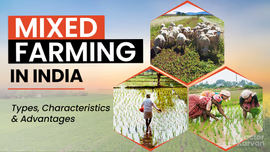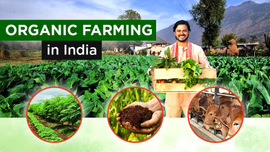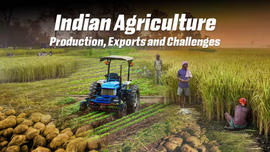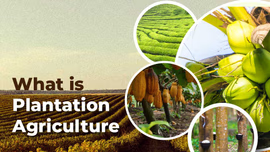What is Pisciculture and How it is Different from Aquaculture

Table of Contents
- Introduction
- Pisciculture
- Aquaculture
- Difference Between Pisciculture and Aquaculture
- Importance of Pisciculture and Aquaculture
- Conclusion
Introduction
The fishing industry comprises a diverse range of forms and types depending on the exact nature of these. Pisciculture and aquaculture are the two forms of water farming that are often used interchangeably, as both involve practices related to fish farming. While both practices are essential and heavily contribute to the fishing industry, knowing their differences is crucial. This blog will focus on pisciculture and how it differs from aquaculture.
Pisciculture
A form of fish farming that explicitly involves rearing and farming fish in an artificially controlled environment is used as the pisciculture definition. This controlled fish cultivation can be for recreational, conservational or commercial purposes. It primarily focuses on fish farming and involves activities such as disease control, fish feeding and fish harvesting according to the use case. There are three types of pisciculture. These are:
Monoculture
This involves the farming of only one species of fish. This makes it one with a high quality level and production. The fish farmed in this type are aimed at catering to the masses. In India, shrimp farming is a typical example of monoculture.
Polyculture
As the name suggests, this type of pisciculture involves farming different fish species. Various species of similar fish are reared in the same pond. The eating habits in this system are regularly changed to ensure the survival of each species on diverse foods offering diverse nutrients.
Monosex Culture
It focuses on rearing of all-male or all-female fish of a particular species. Fish production through this method is distinct, with Tilapia being a notable example of a species often used in monosex culture.
Aquaculture
Aquaculture is another form of fish farming, which involves farming all the aquatic life. It involves farming fish, shrimps, aquatic plants and aquatic organisms. It also involved farming in a controlled environment and cultivating marine and freshwater organisms. Aquaculture involves fish farming and cultivating other aquatic life forms for environmental, conservational, economic and consumption purposes. It is essential as it offers sustainable seafood production, employment, food security, and economic growth.
Difference Between Pisciculture and Aquaculture
Aquaculture and pisciculture differences can be understood from a few points:
|
|
Pisciculture |
Aquaculture |
|
Cultivation |
Different fish varieties in lakes, ponds, or large tanks |
Aquatic flora and fauna like algae, fish farming and other marine life forms |
|
Environment |
Freshwater environments for the cultivation process |
Freshwater environment, marine environment or brackish water |
|
Species |
Uses only fish species for cultivation |
Uses fish, oysters, seaweed, shrimp and other aquatic life |
|
Methods |
Involves a tank or pond-based cultivation approach |
Comprises a broader range of cultivation approaches like raceways and others |
Even though both pisciculture and aquaculture have similarities and differences, both aim for common goals such as saving fish species, harvesting for food consumption and commercial purpose, and managing biodiversity.
Importance of Pisciculture and Aquaculture
According to Invest India, the fishing industry in India has witnessed and sustained annual growth of over 8 per cent from 2014-15 to 2021-22. While inland fisheries contributed 75 per cent, the remaining 25 per cent was contributed by the marine fisheries. A lack of understanding can quickly create an aquaculture vs pisciculture situation; thus, it is necessary to understand their importance in the larger context. Understanding these two concepts is further essential if you are looking to start a profitable fish farming business.
Food Security
With a constantly growing global demand for seafood, the role of pisciculture and aquaculture has become more critical in meeting this ever-increasing demand for seafood. These approaches offer an efficient and sustainable means for cultivating fish and other aquatic forms to fulfil the growing population's demand.
Environmental Influence
In both pisciculture and aquaculture, the practices involved are sustainable and thus have a less negative influence on the environment as compared to other traditional approaches. It involves efficient water and waste management, quality control in water and other aspects, and optimal resource use has less to negligible disturbance to the ecology, promoting environmental sustainability.
Economic Implication
Pisciculture and aquaculture generate significant economic benefits such as offering employment opportunities to the locals, boosting the economies and offering commercial opportunities. It helps alleviate the living standard of the households involved in the fisheries sector.
Reducing Pressure on Natural Stock
Aquaculture and pisciculture help reduce dependence on natural stock by farming and cultivating fish and other aquatic species. It also reduces overfishing in the natural environment and prevents fish population reduction.
Conclusion
To summarize it all, pisciculture is different from aquaculture. However, both play a crucial role in meeting the increasing demand for seafood and help preserve the environment by promoting sustainable approaches. Both practices offer an alternate way to manage the growing food demand and prevent excessive dependence on natural stock. If you want to enter the fish farming business, you can take advantage of the ever increasing demand for fish and fish products.


Related Blogs












